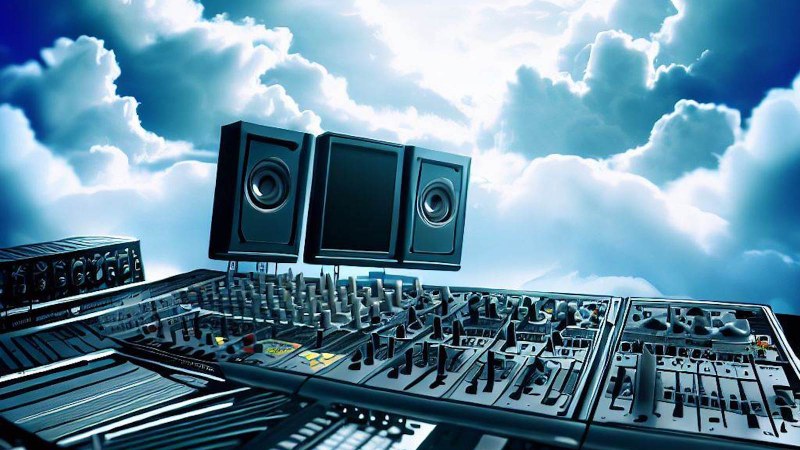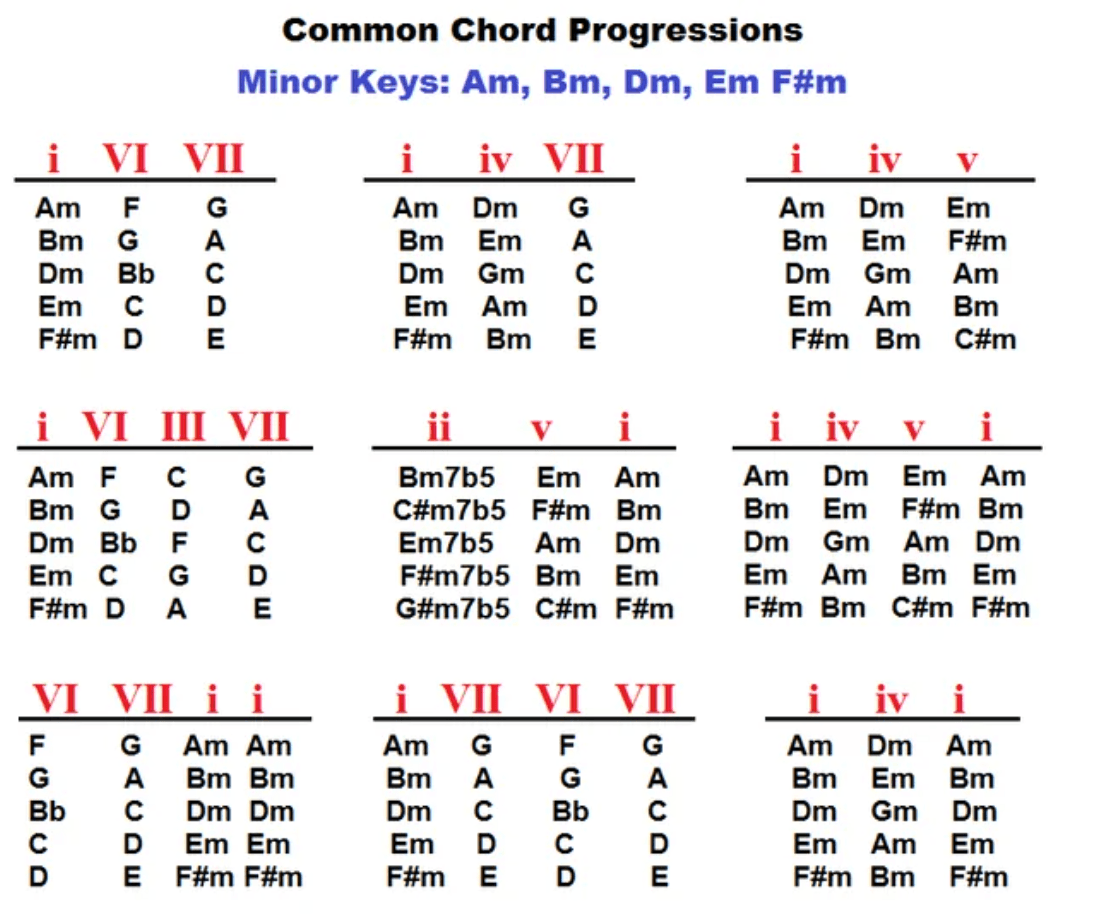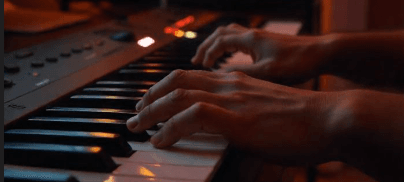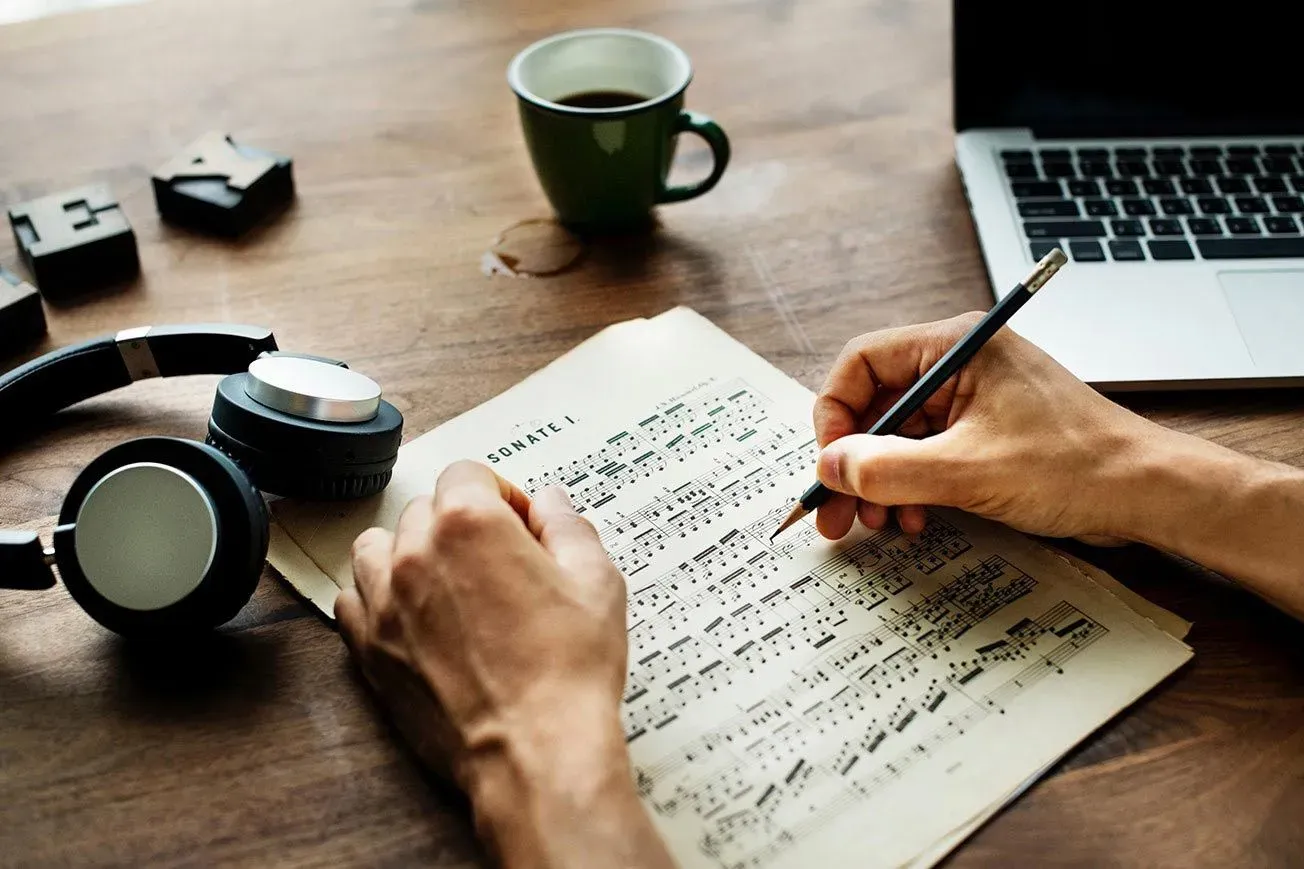Ever wonder how AI for music is reshaping the audio landscape?
Well, stick around because this article unpacks how artificial intelligence is empowering musicians with unparalleled creative tools.

AI in the Music Industry: A Creative Partner for Elevating Human Talent
One of the most thrilling advancements in music production is the rise of AI tools in the industry.
Dismiss the myth that AI will replace human musicians—that's more fiction than fact.
In reality, artificial intelligence functions as a creative collaborator, enhancing and supporting human ingenuity rather than replacing it.
What is AI and How Does It Work? Demystifying the Buzzword
Artificial intelligence isn't a nebulous or magical entity; it's a branch of computer science that utilizes specific algorithms and extensive databases to analyze patterns and make informed decisions.
In the realm of music, these algorithms can dissect compositions down to their bare bones, study elements specific to each genre, and even create new pieces of music.
Far from making human artists redundant, AI opens new avenues for creativity and innovation.
Algorithms and Databases: The Core Elements of AI Functionality
When discussing how AI operates, the conversation inevitably centers on two key pillars: algorithms and databases. An algorithm is a set of rules or instructions that the AI follows.
These algorithms, often incredibly complex, can analyze musical elements such as pitch, tempo, and harmony to either offer suggestions for improvement or create entirely new compositions.
The databases serve as the 'knowledge base' for these algorithms.
They contain a wealth of information, like different types of chord progressions, common tempo settings for specific genres, or even popular lyrical themes.
When you input a certain mood or style into an AI music tool, the database helps the algorithm understand what sort of output would be most appropriate and original.
The Creative Synergy: AI and Human Musicians
The long hours and late nights in the studio are a rite of passage for any serious musician.
AI doesn't eliminate the need for that dedication and hard work.
What AI provides is smart support that can make your creative hours more efficient and artistically rewarding.
Whether you're grappling with a tricky chord progression, seeking a fresh melody, or searching for an ideal bridge, AI can chime in with inventive ideas you might not have conceived on your own.
AI as a Complementary Tool: Not a Replacement
One of the key things to remember is that AI in music serves to complement human creativity, not replace it.
Though AI can whip up a chord progression rooted in algorithms and data, it's human intuition that injects the soul and emotion into the piece.
It's a seamless fusion of technological precision and human creativity, a partnership poised to break new ground in the realm of audio production.
By leveraging AI's capabilities, artists can elevate their creative scope, delve into untapped musical dimensions, and set new benchmarks for what can be accomplished in the musical universe.
So the next time you hit a creative roadblock, think about bringing this ingenious collaborative partner into your creative space.
With AI by your side, who knows what new musical frontiers you could discover?
The Concept of Generative Music and Its History
The Genesis of the Term: Brian Eno and SSEYO's Koan Software
When it comes to the realm of generative music, the name Brian Eno often pops up as a seminal figure.
Eno coined this term back in 1995 while collaborating with SSEYO on their Koan software.
This collaboration wasn't just a footnote in music history; it represented a pivotal moment that would redefine the boundaries of musical composition and audio production.
The Nuts and Bolts of Koan: Pioneering Real-Time Music Generation
Koan wasn't just another piece of software; it was a revolutionary tool that permitted real-time music generation.
Its algorithms could create continuously evolving music based on a set of pre-defined rules or parameters.
Developed initially for the Windows platform, work on Koan began as early as 1990, and it became publicly available in 1994.
A year later, Brian Eno's partnership with SSEYO breathed new life into this innovative tool and led to the release of his 1996 title 'Generative Music 1 with SSEYO Koan Software.'
What Exactly is Generative Music? Unveiling the Mystery
Generative music refers to compositions that are ever-different and changing, produced by a systematic process.
While the term was formally coined by Eno, its implications have grown to cover a diverse array of musical expressions.
This spectrum spans from entirely random mixes created by multiple simultaneous CD playback to sophisticated computer compositions based on elaborate rule sets.
The Evolution of Generative Concepts: Beyond Koan
Since the time of Koan, the concept of generative music has evolved substantially.
Progress in artificial intelligence and computing capabilities have given rise to increasingly intricate algorithms and guidelines, expanding the range and potential of what generative systems can achieve.
The word "generative" now represents not merely a genre of music, but a comprehensive methodology for crafting soundscapes that are as vibrant as they are distinct.
Generative Music in the Modern World: A Symphony of Algorithms and Creativity
Today, generative music has found its place in everything from modern art installations to background scores for meditation apps.
While the technology has advanced, the essence remains the same: a system that generates music which is not just original but perpetually unique, offering endless variations that keep the listener engaged.
As we navigate a period where the distinction between human creativity and machine capability grows increasingly nuanced, generative music emerges as a compelling example of human innovation enhanced by technological strides.
So the next time you find yourself captivated by a musical piece that seems to alter and develop with every replay, remember you're appreciating a musical genre that owes its existence to trailblazers like Brian Eno and innovative software platforms like Koan.
Far from being a modern fad, generative music is a nuanced, evolving art form that challenges our traditional understanding of composition and creativity.

The Dawn of a New Creative Era: AI as Your Sonic Co-Pilot
If you're a budding musician or a content creator, AI has increasingly become an indispensable asset in the field of audio production.
These AI-based music utilities do more than just simplify the creative workflow; they also push the boundaries of what can be achieved musically.
Here's a roundup of some of the industry-leading AI for music generators that can enhance your creative repertoire.
1. Soundraw: Your Personalized Composer
Soundraw is more than just an AI music tool; it's like having a virtual composer at your fingertips.
Soundraw offers remarkable customization, allowing you to adjust the length, genre, and composition of your music.
Whether you're producing video content or laying down the foundation for your next hit, Soundraw's extensive customizability makes it a go-to platform for all things musical.
2. AIVA: The Virtuoso of AI-Composed Tracks
AIVA stands out as a pioneer in the realm of AI-composed original tracks.
This platform uses complex algorithms and databases to produce music that's not just algorithmically generated but truly original.
With AIVA, the next hit single could be a collaboration between you and artificial intelligence, merging human emotion with machine precision.
3. Soundful: Create, Monetize, Repeat
What sets Soundful apart is its dual capability to both create and monetize unlimited tracks.
It provides music artists and content creators with a royalty-free way to not only generate but also monetize their creations.
From the first note to the last cent earned, Soundful is a comprehensive platform for the modern creative.
4. Loudly: A Stem-Cell Treatment for Your Musical Needs
If you're into audio production, Loudly brings something unique to the table.
It offers music stems from all your AI-created songs, making it a breeze to import these stems directly into your Digital Audio Workstation or Video Editing software.
The possibilities to play, mix, and modify are endless, giving you unprecedented control over your musical output.
5. Jukebox: The Neural Net Maestro
What if you could have a neural network brainstorm your next track? That's exactly what Jukebox offers.
By using neural nets, Jukebox can generate raw audio forms based on your inputs like genre, artist, or even lyrics.
It's like having a team of experts from various musical backgrounds working in tandem to create a unique, compelling piece of art.
Unlocking Creative Potential: AI as Your Co-Pilot in Crafting Masterpieces
In an age where everyone is vying for the next big hit or the perfect soundtrack, these AI music tools offer a cutting-edge advantage.
Whether it's a custom tune, an original composition, or an intricate mix, AI is here to be your co-pilot in your creative journey.
Choose the one that aligns with your vision, and make the act of creation as enjoyable as the final masterpiece.
Empress AI Music Tools: Your New Creative Partner
In the ever-evolving landscape of audio production, it's crucial to have cutting-edge tools at your disposal.
Meet Empress, your new suite of AI music tools designed to amplify your creative vision.
Whether you're a seasoned musician or a YouTuber in need of the perfect background track, Empress has something for everyone.
1. Melody Mind: The Composer in Your Pocket
Ever got stuck finding the right melody for your piece? Melody Mind is here to help.
All you need to do is input the instrument, chords, genre, and bpm, and you're ready to roll.
For instance, if you're working with an electric guitar in a jazz setting with a bpm of 120, Melody Mind can generate a captivating tune to jazz up your project.
It's like having a pocket-sized composer who knows exactly what you need.
2. Lyric Lab: The Poet You Always Wanted
Struggling with writer's block? Lyric Lab is the remedy.
This AI lyrics generator lets you input the genre and tone or style, and it will take care of the rest.
Want lyrics that fit a Futuristic Sci-Fi theme with an ominous tone? Consider it done.
Lyric Lab will produce words that can turn your musical thoughts into lyrical reality.
3. Chord Candy: Your Virtual Music Theory Prof
When it comes to composing, chords are the building blocks.
Chord Candy simplifies this aspect by providing AI-generated chord progressions.
Just input your instrument, key, genre, and bpm, and Chord Candy will generate the chords that serve as the perfect foundation for your next masterpiece.
4. Song Idea Generator: Evoke Emotions Through Music
Looking for a way to capture a specific mood in your composition? Song Idea Generator has you covered.
Whether you're aiming for Depression or Euphoria, just input the emotion and let this tool provide a structured song idea.
It turns emotions into melodies, giving your music the depth it deserves.
5. Bass Brain: The Bassist You Never Had
A great song isn't complete without a solid bassline, and Bass Brain is here to make sure you get it right.
Input the type of bass, chords, genre, and bpm, and watch as Bass Brain lays down a groove that perfectly complements your song.
From funk to metal, this tool has a bass for every genre.
6. Drums De Dior: A Beat for Every Mood
The beat is the heart of any song, and Drums De Dior understands that.
Whether you're looking for a snappy beat for a pop song or a nuanced rhythm for jazz, this AI drum generator has got your back.
Just input the genre and bpm, and let the beatboxing begin.
7. Harmonious Hitmaker: From Titles to Chart-toppers
Got a catchy title but not sure how to turn it into a full-fledged song? Harmonious Hitmaker is here to help.
Simply input in the emotion and genre, and this tool will churn out a song structure that's tailor-made to become a hit.

AI: A New Source of Inspiration and Education
Artificial intelligence isn't just about optimizing business processes or automating mundane tasks; it's also a boundless source of inspiration and education, particularly in the music industry.
Whether you're a seasoned musician or a vlogger in need of fresh background music, AI can be your creative muse and teacher.
For the Content Creator: A Soundtrack for Every Scenario
Imagine you're a content creator gearing up to release your August vlog. You've got the visuals down but need a unique and fitting soundtrack to complete the package.
Thanks to AI, you don't have to sift through royalty-free music libraries or settle for generic tunes.
Various AI music generators can curate a soundtrack tailored to the mood, theme, and pacing of your content.
Want a quirky, upbeat tune? Or perhaps a melancholic melody that evokes nostalgia? AI has got you covered.
For the Aspiring Artist: Tune In to New Possibilities
If you're an aspiring musician, AI can serve as your collaborative partner, guiding you through the labyrinthine process of music composition.
AI-based tools can offer fresh perspectives and unconventional techniques you might not have considered.
Whether it's suggesting a chord progression or generating a melody line, AI can help you think outside the traditional box of music theory.
It could be the catalyst that turns your good song into a great one.
For the Music Educator: A Teaching Aid Like No Other
Music educators also have much to gain from the advances in AI technology.
Traditional teaching methods often focus on repetitive drills and theoretical knowledge.
Integrating AI tools into the curriculum can make the learning process interactive and adaptive.
Students can get real-time feedback, access a vast library of music samples, and even have AI evaluate the originality and technical proficiency of their compositions.
Bridging the Gap: AI for Music Lovers with Zero Knowledge
Perhaps you're someone who loves music but can't play a note to save your life. AI can serve as an educational bridge, providing an intuitive and user-friendly way to understand music's fundamental elements.
With interactive interfaces and step-by-step guidance, these tools can offer a simplified yet informative introduction to music.
This makes it easier for you to appreciate the art form on a deeper level or even begin dabbling in music production yourself.
The Harmonic Convergence of AI and Music
From offering unique tracks for your vlogs to enriching the learning experience in music education, AI is proving itself to be a transformative force in the realm of music.
By unlocking new avenues for creative expression and educational engagement, AI is indeed changing the game—but not the rules—of what's possible in music.
Unleash Your Creative Potential with Empress
Why settle for less when you can have more? Empress offers a suite of AI music tools that can elevate your audio production to the next level. Don't just be a spectator; create, inspire, and lead with Empress.
FAQs: AI for Music
Q1: How Do I Choose the Right AI Music Tool for Me?
Choosing the right AI music tool depends on your specific needs and goals. Consider factors like ease-of-use, genre specialization, and how well the tool integrates with your existing setup to make an informed choice.
Q2: Can AI generate any genre of music?
Yes, most AI tools offer multiple genre options.
Q3: Is the music generated by AI royalty-free?
Most AI music tools offer royalty-free music, but always check the terms.
Q4: Can AI help in music education?
Absolutely, from teaching chords to generating practice drills.
Q5: What is 'generative music'?
It's music created by a system, which is ever-changing and unique.
Follow the future of music with Empress. Check out our blog to learn how you can effectively use these AI music tools.


